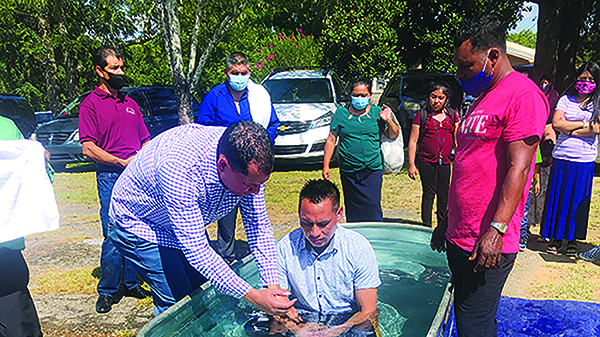Amid the challenges of COVID-19, Hispanic Baptists throughout Alabama are ready to broaden their reach through training more pastors and multiplying church plants in the state.
They pretty much just need to know when and where, according to those who work in Hispanic ministry in the state.
Training options
Right now, the Alabama Baptist State Board of Missions is considering new training options with helping Hispanic churches equip pastors for ministry. By the first of next year, they hope to either roll out their own training materials or implement an already established program with a similar focus, said Annel Robayna, church planting strategist focused on Hispanic work with the SBOM.
Developing leaders
“Our main thing right now is to create a strategy across the state that will develop leaders, lay leaders, missionaries, church planters, pastors, [and] worship leaders that would equip the saints for the work of the ministry and that everybody has access to,” Robayna said. “We’re taking the rest of this year to plan it well and launch something beginning of next year.”
According to the Atlanta-based Bible Training Centre for Pastors, there are more than 3 million untrained pastors worldwide, which the website said makes up 85% of churches. The center’s training curriculum, Robayna said, is one of the options the state convention is considering as a source for training pastors. The program, he noted, trains leaders from “all walks of life and experiences” and equips them to train others for ministry.
One advantage with using a system like this one, he said, “is that it will target a lot of the language groups that we have in Alabama — Korean, Chinese, Spanish and others.”
Right now, Cary Hanks, who works with the Central Alabama Baptist Hispanic Ministry Coalition, is training Hispanic leaders in the Birmingham area, but he also hopes to see training options expanded. The coalition Hanks directs is a nonprofit group with a board made up of members from seven Baptist associations in the state, churches and the SBOM.
Hanks helps train Hispanic Baptists for ministry and coordinates the Hispanic Baptist Bible Institute that meets at Indian Springs First Baptist Church in Shelby County. The institute is an extension of the Hispanic Bible Institute in Louisville, Kentucky.
Train and equip
While the program he works with has helped provide Hispanic pastors with solid theological training, Hanks said there is a need for a more church-based, reproducible process in Alabama — one that allows trained pastors, who may lack the credentials required by some academic programs, to be able to train and equip other pastors for ministry.
Strong response
Hanks plans to continue the current program he is working with for now, but he is open to utilizing the same curriculum as SBOM after his current class of students graduate.
The coronavirus pandemic has only complicated things, both Hanks and Robayna said.
Both men have been working to help Hispanic pastors and ministry leaders as they navigate the economic and social challenges that have come with COVID-19.
“Like the Anglo churches, they’ve had to figure it out,” said Hanks, a former International Mission Board missionary who served in Ecuador for 15 years. While most churches now are holding in-person services, many Hispanic pastors continue to work through the best approaches to video conferencing and livestreaming with less staff and resources. But the response by Hispanic pastors overall has been strong.
‘Heightened interest’
“A crisis like this really kind of heightens people’s interest in the gospel,” Hanks said. Church leaders are “working hard to find ways to maintain the fellowship and unity and to continue to guide the churches that they pastor.”
Robayna, who joined the SBOM in 2019, said right now churches of all ethnicities are seeking a sense of “normalcy.”
He described this year as one of learning and uncharted territory for Hispanic churches.
The SBOM has provided special online trainings covering a variety of issues among these congregations, which include family relationships and studies that are focused on the denomination.
“We are strengthening the bases of what our beliefs are and how to practice our belief and what does it mean to be Southern Baptist,” Robayna said. “We’re working with [churches] to join their local associations and join Baptist work. That has been happening all online.”
One of the keys to his ministry work, Robayna said, is understanding that each Hispanic church is unique.
Continued change
“There are Central Americans, there are South Americans, there’s people from Puerto Rico, from the Islands, from Cuba,” he said. “Even though we kind of speak the same language, all churches are different, the context is different.”
“I have pastors who are ministering to indigenous Guatemalans who are in the northern part of the state,” he said. “When I talk about indigenous, I’m talking about people [for whom] Spanish is [their] second language, and English is their third language.”
And lives are continuing to change for Christ, he said.
“As far as locally, I’ve had three churches baptizing new believers,” he said. “I have some reporting that their offerings are the best they’ve ever been.
“COVID has not stopped the church or the power of the gospel.”






Share with others: